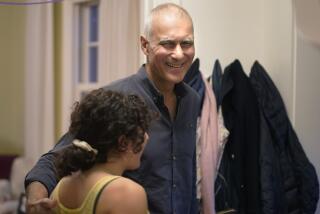Bernard Katz, 92; Findings About Neurotransmitters Led to a Nobel
- Share via
Sir Bernard Katz, a British physiologist who shared the 1970 Nobel Prize in physiology or medicine for discovering how nerve cells communicate with each other and with the muscles they control, died April 20 in London. He was 92.
He shared the $78,000 prize with Swede Ulf von Euler and American Julius Axelrod for elucidating the workings of neurotransmitters: chemicals that carry messages with lightning speed across gaps between cells.
The work yielded “basic information about how messages are mediated between nerve cells” and has “greatly stimulated the search for remedies against nervous and mental disturbances,” leaders of the Nobel Foundation said when the award was announced.
Katz learned he had received the prize while standing in rumpled blue pajamas in the hallway of the faculty club at UC Berkeley, where he was giving a guest lecture. It was only after a cold shower that he truly comprehended the honor, he said later. Katz was known for his humility and spent much of his Nobel banquet speech discussing how his many collaborators over the years should have been honored as well.
He and the other winners were trying to explain how the electrical impulses that travel along nerve fibers could send messages to other nerve cells across synapses, or gaps between nerve cells. After a discovery by others that muscles release a chemical called acetylcholine after nerve cells fire on them, Katz found that nerve cells regulate muscles by releasing discrete amounts of the chemical in “packets.” Many packets were required for a nerve to actually fire, but a few packets at a time flowed even when the nerve cell was at rest. When an agent such as nerve gas blocks these packets, paralysis or death ensues.
Katz was born in Leipzig, Germany, and was of Russian Jewish origin. He studied medicine at the University of Leipzig and received his medical degree in 1934 at age 23. A year later, he fled Nazi Germany and began studies at University College in London. He received a doctorate in 1938 and then began work in a laboratory at Sydney Hospital in Australia. He was able to bring his parents out of Nazi Germany the same year. He joined the Royal Australian Air Force in 1942 and served as a radar officer in the southwest Pacific until the end of World War II.
Katz became a British citizen and returned to University College in 1950. He was initially what the British call a “reader” there, then professor and finally head of the department of physiology. Katz was a fellow of the Royal Society and of the Royal College of Physicians. He was knighted in 1969.
His wife died in 1999. He is survived by two sons, David and Jonathan.






